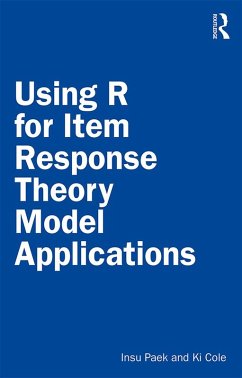
The SAGE Handbook of Quantitative Methods in Psychology (eBook, PDF)
Versandkostenfrei!
Sofort per Download lieferbar
89,95 €
inkl. MwSt.

PAYBACK Punkte
45 °P sammeln!
`I often... wonder to myself whether the field needs another book, handbook, or encyclopedia on this topic. In this case I think that the answer is truly yes. The handbook is well focused on important issues in the field, and the chapters are written by recognized authorities in their fields. The book should appeal to anyone who wants an understanding of important topics that frequently go uncovered in graduate education in psychology' - David C Howell, Professor Emeritus, University of VermontQuantitative psychology is arguably one of the oldest disciplines within the field of psychology and ...
`I often... wonder to myself whether the field needs another book, handbook, or encyclopedia on this topic. In this case I think that the answer is truly yes. The handbook is well focused on important issues in the field, and the chapters are written by recognized authorities in their fields. The book should appeal to anyone who wants an understanding of important topics that frequently go uncovered in graduate education in psychology' - David C Howell, Professor Emeritus, University of Vermont
Quantitative psychology is arguably one of the oldest disciplines within the field of psychology and nearly all psychologists are exposed to quantitative psychology in some form. While textbooks in statistics, research methods and psychological measurement exist, none offer a unified treatment of quantitative psychology. The SAGE Handbook of Quantitative Methods in Psychology does just that.
Each chapter covers a methodological topic with equal attention paid to established theory and the challenges facing methodologists as they address new research questions using that particular methodology. The reader will come away from each chapter with a greater understanding of the methodology being addressed as well as an understanding of the directions for future developments within that methodological area.
Drawing on a global scholarship, the Handbook is divided into seven parts:
Part One: Design and Inference: addresses issues in the inference of causal relations from experimental and non-experimental research, along with the design of true experiments and quasi-experiments, and the problem of missing data due to various influences such as attrition or non-compliance.
Part Two: Measurement Theory: begins with a chapter on classical test theory, followed by the common factor analysis model as a model for psychological measurement. The models for continuous latent variables in item-response theory are covered next, followed by a chapter on discrete latent variable models as represented in latent class analysis.
Part Three: Scaling Methods: covers metric and non-metric scaling methods as developed in multidimensional scaling, followed by consideration of the scaling of discrete measures as found in dual scaling and correspondence analysis. Models for preference data such as those found in random utility theory are covered next.
Part Four: Data Analysis: includes chapters on regression models, categorical data analysis, multilevel or hierarchical models, resampling methods, robust data analysis, meta-analysis, Bayesian data analysis, and cluster analysis.
Part Five: Structural Equation Models: addresses topics in general structural equation modeling, nonlinear structural equation models, mixture models, and multilevel structural equation models.
Part Six: Longitudinal Models: covers the analysis of longitudinal data via mixed modeling, time series analysis and event history analysis.
Part Seven: Specialized Models: covers specific topics including the analysis of neuro-imaging data and functional data-analysis.
Quantitative psychology is arguably one of the oldest disciplines within the field of psychology and nearly all psychologists are exposed to quantitative psychology in some form. While textbooks in statistics, research methods and psychological measurement exist, none offer a unified treatment of quantitative psychology. The SAGE Handbook of Quantitative Methods in Psychology does just that.
Each chapter covers a methodological topic with equal attention paid to established theory and the challenges facing methodologists as they address new research questions using that particular methodology. The reader will come away from each chapter with a greater understanding of the methodology being addressed as well as an understanding of the directions for future developments within that methodological area.
Drawing on a global scholarship, the Handbook is divided into seven parts:
Part One: Design and Inference: addresses issues in the inference of causal relations from experimental and non-experimental research, along with the design of true experiments and quasi-experiments, and the problem of missing data due to various influences such as attrition or non-compliance.
Part Two: Measurement Theory: begins with a chapter on classical test theory, followed by the common factor analysis model as a model for psychological measurement. The models for continuous latent variables in item-response theory are covered next, followed by a chapter on discrete latent variable models as represented in latent class analysis.
Part Three: Scaling Methods: covers metric and non-metric scaling methods as developed in multidimensional scaling, followed by consideration of the scaling of discrete measures as found in dual scaling and correspondence analysis. Models for preference data such as those found in random utility theory are covered next.
Part Four: Data Analysis: includes chapters on regression models, categorical data analysis, multilevel or hierarchical models, resampling methods, robust data analysis, meta-analysis, Bayesian data analysis, and cluster analysis.
Part Five: Structural Equation Models: addresses topics in general structural equation modeling, nonlinear structural equation models, mixture models, and multilevel structural equation models.
Part Six: Longitudinal Models: covers the analysis of longitudinal data via mixed modeling, time series analysis and event history analysis.
Part Seven: Specialized Models: covers specific topics including the analysis of neuro-imaging data and functional data-analysis.
Dieser Download kann aus rechtlichen Gründen nur mit Rechnungsadresse in A, D ausgeliefert werden.













